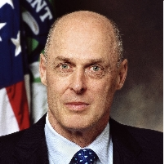Officials
Back to Officials


Offical

Name: Paulson, Henry
Current Position: Previous Secretary
Henry M. Paulson, Jr. served as the 74th Secretary of the Treasury from June 19, 2006, until the end of the administration of George W. Bush. Paulson graduated from Dartmouth in 1968, where he majored in English, was a member of Phi Beta Kappa and an All Ivy, All East football player. He received an MBA from Harvard in 1970.
Paulson began his career in the federal government working in the Nixon administration as a staff assistant to the Assistant Secretary of Defense at the Pentagon from 1970 to 1972. He then worked as a member of the White House Domestic Council, serving as staff assistant to President Nixon from 1972 to 1973.
Paulson left for the private sector in 1974, joining the Chicago office of Goldman Sachs. He rose through the ranks holding several positions, including managing partner of the firm’s Chicago office, co-head of the firm’s investment banking division, president and chief operating officer, co-senior partner and finally chairman and CEO.
While serving as Treasury secretary, Paulson has been at the center of critical debates over the nation’s sagging economy and the corresponding mortgage crisis. In the spring of 2008, Paulson surprised many with his proposal for addressing the nation’s economic woes by offering a major overhaul of the American approach to government regulation.
One important aspect of Paulson’s plan would reorient government regulation from a “rules-based” system toward a “principles-based” approach.
As noted in the New Yorker, “In a rules-based system, lawmakers and regulators try to prescribe in great detail exactly what companies must and must not do to meet their obligations to shareholders and clients. In principles-based systems, which are more common in the United Kingdom and elsewhere in Europe, regulators worry less about dotted ‘’'s and crossed ‘t’s, and instead evaluate companies’ behavior according to broad principles. .... This approach gives companies more leeway in dealing with investors and customers—not every company needs to follow the same rules on, say, financial reporting—but it also gives regulators more leeway in judging whether a company is really acting in the best interests of shareholders and consumers.”
In addressing the housing crisis in July 2008, and in particular the federal government’s proposals for rescuing mortgage giants Fannie Mae and Freddie Mac, Paulson indicated that Washington, DC, would probably not have to bear the brunt of propping up both firms. Some observers openly questioned Paulson’s rationale that the “mere pledge of government backing for the two mortgage giants would restore market confidence” and get the two lending houses back on their feet. In fact, less than two months later, the federal government did seize both companies.
Unlike his boss, President Bush, Paulson believes global warming is a legitimate threat to the planet. In addition to his role as the nation’s top fiscal official, Paulson serves as chairman of The Nature Conservancy. His environmentalist perspective comes from having been raised as a Christian Scientist on an Illinois farm. Before college he wanted to become a forest or park ranger. He and his wife, Wendy, are both skilled birders. At their house in Illinois, they’ve raised birds, dogs, cats, raccoons, flying squirrels, lizards, snakes, mice, turtles, frogs and a tarantula.
Can you trust a Wall Street veteran with a Wall Street bailout? (by Kevin G. Hall, McClatchy Newspapers)
'The Game Is Over' (editorial, Washington Post)
Paulson Warns Of More Tough Times (Paulson on Face the Nation)
Parsing Paulson (by James Surowiecki, New Yorker)
Whether it's McCain or Obama, Henry Paulson won't be staying on at Treasury (by Leslie Hoffecker, Los Angeles Times blog)
A global warming believer in Bush Cabinet (by John Heilprin, Associated Press)
A Strategic Economic Engagement: Strengthening U.S.-Chinese Ties (by Henry Paulson, Foreign Affairs magazine)
Henry Paulson on Charlie Rose (YouTube video)
- Latest News
- D.C. Public Schools will Teach all Second-Graders to Ride a Bike
- New Rule in Germany Limits Sales of Sex-Themed E-Books to 10pm to 6am
- What Happened to the 6-Year-Old Tibetan Boy the Chinese Government Kidnapped 20 Years Ago?
- U.S. Ambassador to Turkey Photoshops his Hair Color to Mock Turkish Mayor
- Mystery Artist Calls Attention to Unfixed Potholes by Drawing Penises around Them




